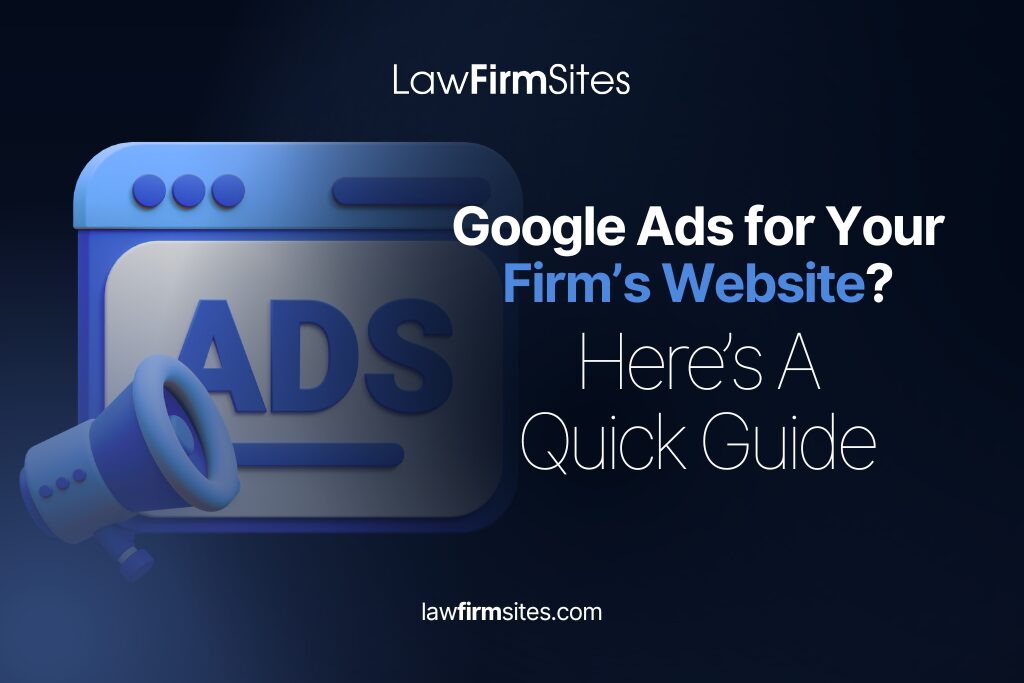Google Ads for Your Firm’s Website? Here’s A Quick Guide

What makes Google Ads a valuable tool for promoting your law firm’s website? In this guide, we demonstrate how Google Ads can drive targeted traffic, accelerate lead generation, and complement your broader digital advertising strategy. By understanding the mechanics of PPC advertising, evaluating costs such as how much Google Ads cost, and applying best practices from smart advertisers, law firms can harness pay-per-click campaigns to secure a steady stream of prospective clients.
What are Google Ads?
Google Ads constitutes an online advertising platform that allows businesses to display paid advertisements on Google’s search results pages and its partner network. These ads appear above and below organic search results, clearly labeled as sponsored content. They operate on a pay-per-click model, where advertisers set a Max CPC Bid, the highest amount they are willing to pay for a single click, and are charged only when a user actually clicks an ad. Google uses a dynamic real-time auction system, factoring in each ad’s bid, Quality Score, and Ad Rank to determine ad placement and cost.
The platform supports campaigns across the Google search network, targeting users actively seeking legal services, and the display network, which reaches audiences through banner ads on websites and apps.
How does Google Ads work?
When a user enters a query relevant to your services, such as “personal injury lawyer near me,” Google evaluates active ads with matching keywords. Advertisers bid on these keywords, specifying a Max CPC Bid that indicates the maximum amount they are willing to pay per click. Concurrently, Google calculates each ad’s Quality Score, which reflects expected click-through rate, ad relevance, and landing page experience. Combining the bid and Quality Score yields the Ad Rank, determining which ads appear and in what order.
Once an ad wins an auction, Google charges the advertiser the amount required to beat the next highest bidder, up to the maximum bid. This Cost Per Click (CPC) often falls below the Max CPC Bid due to the auction’s second-price mechanism. Advertisers can further refine their campaigns using negative keywords to exclude irrelevant traffic, conversion tracking to measure outcomes such as form submissions or phone calls, and data-driven bidding strategies to optimize bids based on performance metrics.
Is it worth investing in Google Ads for your firm’s website?
Investing in Google Ads offers immediate visibility for high-intent search queries, a critical advantage when entering competitive legal markets where organic SEO gains may materialize slowly. Smart advertisers recognize that combining digital advertising with SEO accelerates lead generation: while SEO builds sustainable organic traffic over months, PPC delivers prospects from day one. Moreover, Google Ads’ granular targeting options, by location, device, time of day, and audience demographics, allow law firms to reach local clients effectively.
Typical average CPC for legal keywords ranges from $3 to $12, depending on factors like geographic competition and case practice area. Although this may appear high, detailed ROI assessments reveal that cost-per-client-acquisition remains favorable when campaigns are managed efficiently. By setting clear goals, such as a maximum acceptable cost per acquisition, and continuously monitoring performance, law firms can ensure that Google Ads deliver measurable value.
How much should you spend on Google Ads?
Budget recommendations vary based on firm size, service area, and strategic objectives. A small practice in a mid-size city may allocate $1,000 to $2,000 per month to test keywords, while larger firms in major metropolitan markets might invest $5,000 or more monthly to dominate top positions for high-value searches.
When establishing a budget, begin by estimating the volume of potential clicks using tools such as Google’s Keyword Planner, calculating expected Cost Per Click (CPC) for targeted terms, and projecting a realistic conversion rate for inquiries. For instance, if the average CPC stands at $8 and your site converts 5 percent of clicks into consultations, each client acquisition costs roughly $160. Align this figure with your average case value to determine whether the spend yields desirable ROI.
What are ways to manage your Google Ads budget effectively?
Effectively managing a Google Ads budget requires systematic controls and tactical optimizations. Follow these steps to maintain cost efficiency:
Set Daily and Monthly Limits
Define strict spending caps in your account settings to prevent budget overruns and pause campaigns automatically when thresholds are met.
Use Negative Keywords
Regularly review search term reports to identify irrelevant queries and add them as negative keywords to prevent wasted clicks.
Implement Conversion Tracking
Configure conversion tracking for actions such as form submissions and phone calls, enabling you to focus on campaigns that generate actual leads.
Employ Data-Driven Bidding Strategies:
Activate data-driven bidding strategies to automatically adjust bids based on historical performance and quality score data.
Optimize Landing Pages
Create dedicated landing pages with clear calls-to-action, ensuring that ad traffic encounters a focused experience that boosts both ad relevance and conversion rate.
Schedule Ads by Time and Location
Use ad scheduling and geo-targeting to display ads when and where your target audience is most likely to convert, reducing spend during low-performance periods.
Analyze Search Network vs Display Network
Allocate budget preferentially toward the Google search network for high-intent traffic, while using the display network budget sparingly for brand awareness campaigns.
Review and Adjust Keyword Match Types
Use phrase and exact match types for high-value keywords, and broad match modifiers sparingly; refine match types based on performance data.
Monitor Quality Score Improvements
Identify keywords with low quality score and enhance their ad copy and corresponding landing pages to increase relevance and lower Cost Per Click (CPC).
Pause Underperforming Ads and Keywords
Create performance benchmarks and pause any ad or keyword that fails to meet minimum click-through or conversion metrics over a defined period.
An expert touch to achieve maximum online presence
Google Ads provides law firms with a powerful PPC advertising platform to reach clients actively searching for legal services. By understanding campaign mechanics, such as quality score, ad rank, and Max CPC bid, and managing budgets through data-driven bidding strategies, negative keyword tactics, and targeted landing pages, firms can achieve strong ROI while controlling average CPC. Whether allocating resources to the Google search network for immediate lead generation or exploring brand-building on the display network, effective Google Ads management complements your long-term digital advertising success.
Maximizing your firm’s online reach is just a call away. Contact us today for expert guidance.
Did you like this post? Here are some others you might enjoy:

By Benjamin R. Gold, Esq., Founder of Lawyer Stories Over the years, I’ve had the privilege of interviewing over two…

Managing multi-location SEO for law firms is about earning visibility for each office without creating pages that feel repetitive or…

Law firms can compete without large marketing budgets by building durable visibility, improving conversion efficiency, and earning trust faster than…

